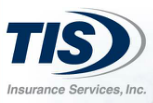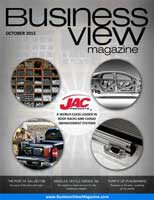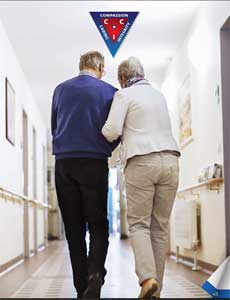The recognized provider of choice in Louisiana’s healthcare markets
Central Control is not the name of a government agency, a fictional, undercover spy ring, or a new, start-up technology firm – although the use of modern technology is something at which this company does excel. Central Control, also known as CCI, is actually in the business of healthcare management. It is a multifarious firm that operates several nursing homes and various other healthcare-affiliated companies throughout the state of Louisiana. The CCI in its name stands for Compassion, Caring, and Integrity – and it is those values, above all others – that have helped propel Central Control to a position of leadership in the field of long-term and rehabilitative care of the elderly and infirm.
CCI was founded in 1978 by Louis and Jerrine Harrell. According to Lannie Richardson, the company’s current Chief Executive Officer, the couple had some friends in Alexandria, LA, who were operating boarding houses for the elderly, and Louis Harrell was intrigued. “He was inspired by the opportunity that this was a business that needed somebody to take state-wide,” Richardson relates. “To provide quality living for the elderly population. And that’s the way it got started.”
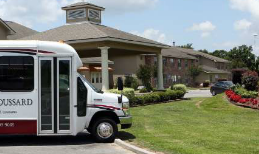 The first Central Control facility was in Alexandria. In its early years, the company grew by building new facilities but, more lately, by acquiring them from other healthcare management groups. “I think Mr. Harrell wanted to make his dream available to as many people as he could,” says Richardson. “And certainly, over the years, as opportunities came along that enabled him to do that, he did so.”
The first Central Control facility was in Alexandria. In its early years, the company grew by building new facilities but, more lately, by acquiring them from other healthcare management groups. “I think Mr. Harrell wanted to make his dream available to as many people as he could,” says Richardson. “And certainly, over the years, as opportunities came along that enabled him to do that, he did so.”
Today, CCI Manages seven long-term care nursing homes, with a total of 1,090 beds; an assisted living facility; a 16-bed, inpatient psychiatric hospital; a home-hospice organization; an outpatient services arm; a health services provider company; and Constant Care Technology, a products division that supplies state-of-the art medical devices and software for the long-term and post-acute care (LTPAC) industry. CCI employs almost 2000 people, approximately half of whom work in one of its nursing-home facilities.
Richardson talks about the many medical, demographic, technological, and even political changes that have combined to alter the modern healthcare-management landscape – particularly in the area of elder care and the role of nursing homes vis a vis the overall healthcare equation. “Nursing homes are moving to more of an acute care population, much like the old chronic care hospitals used to be,” he explains, “and as we have an aging population, we have more chronic-care diseases. So the acuity is much, much higher. You may have an admitting diagnosis of one disease, but you may have co-morbidity of five or six more chronic diseases that we have to care for.”
Over his 40-plus years in the medical field, Richardson has also seen a marked change in the age of long-term care patients. “When I first started, the initial population of admittance, at that time, was around 67 to 70, or 72 years of age. Now we’re seeing that admittance at somewhere around 82 to 85, or 87 years of age.” And because their advanced ages predispose them to a higher potential for more acute medical conditions, these patients generally require a higher level of care.
Another significant change in the industry, according to Richardson, has been the decreasing amount of time residents are remaining in long-term care facilities. “Fifty percent of our admissions are going home within 30 to 40 days of their admission – we call those short stays. In the old days if you got admitted to a nursing home, you very seldom went home.” He attributes this shift to better medical and rehabilitative care for things like strokes, giving its victims better prognoses and more-improved chances for returning back to their jobs, homes, and communities. Also, improved home-health services over the past several years have made staying at home longer, a more viable option. “The way we look at nursing homes is changing,” says Richardson. “We go there for rehabilitation, stay there a short period of time, then we go back to our homes, to continue our rehabilitation with home healthcare.”
These two important transformations – shorter stays and higher acuity– have driven CCI’s management to adapt. Dealing with short stays, Richardson believes, is definitely an operational and labor-intensive challenge. “It requires us to have more staff to admit more people and take care of more people faster,” he says, “because the admitting and the care planning and the integration of the nursing staff and therapy are much more intense. In a fast-paced environment, you’ve got to diagnose, you’ve got to have a care plan as quickly as possible because these people want to go home. So we have to take care of them so that they can regain their functionality and make them retake their place in the community. We recently contracted with two physicians to do physical rehab medicine within our facilities to get the best possible rehabilitation, and review what our therapists are doing and give them increased direction.”
And because the acuity of its residents continues to rise, CCI has had to respond by upping the skills and certifications of its nursing staff. “We’ve been working intensely for the last five to six years at training our nursing staff for higher acuity. Hardly anybody did IV (intravenous) therapy five years ago. Every facility that we have does IV therapy, now. We have a wound-care nurse, who is wound-care certified by the Board of Nurse Practitioners. She’s only one of thirteen in the state. She circulates around our nursing homes to help them with their wounds. We’ve had a dramatic reduction in our in-house wounds and we’re able to take more complex wounds from hospitals, now, because we have her on staff.”
CCI has also taken a leadership role in the 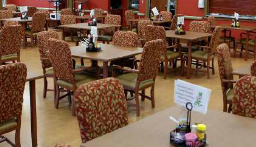 use of advanced data systems and diagnostic technologies. “We were one of the first nursing homes in the state of Louisiana to have electronic medical records,” Richardson notes. “We felt that was really necessary because it enables us to look at the quality of care that’s going on within our facility from a central location, and have multiple consultants going through the charts, looking for things that stick out, or that need to be corrected.”
use of advanced data systems and diagnostic technologies. “We were one of the first nursing homes in the state of Louisiana to have electronic medical records,” Richardson notes. “We felt that was really necessary because it enables us to look at the quality of care that’s going on within our facility from a central location, and have multiple consultants going through the charts, looking for things that stick out, or that need to be corrected.”
CCI now employs a new software platform that, according to Richardson “does better intake assessments and develops care pathways for our residents so that we may track their care all the way through their care setting. And we also developed, and are using, software which does electronic vital-signs capture, much like you’ll see in a hospital, which allows us to do that within our nursing homes. It uploads into our electronic medical records, instantaneously, so we know that the documentation of the vital signs is not only accurate, but instantaneous. And it also allows us to have an electronic record of variations and patterns in vital signs measurements.
“We also installed in our nursing homes, two years ago, electronic medication dispensing units that will communicate with our EMR (Electronic Medical Records). It allows us to dispense emergency medication 24 hours a day, seven days a week, so that if we run out of medication, or have a new admit, we’re able to get that medication from our electronic dispensing system.”
While CCI continues to stay on the cutting edge in its use of sophisticated, healthcare management tools, it also pays strict attention to the daily care and safety of its many elderly, nursing-home residents. Richardson outlines some recent additions and improvements: “We have, for the safety of our patients, electronic, magnetic locks on all of our outside doors so that, at night, the nurses and the residents and their families are secure against any outside intruders that may try to get into the facility. It also secures the building so that anybody who might have dementia will not exit the building without having somebody knowing about it. We have installed cameras in all of our common areas so that we’re able to monitor any problems or actions that might be unintended or have consequences that we need to know about. Also, if the patient’s family would feel better about installing a camera in the patient’s room, so that they’re able to monitor what goes on in the room, we allow that. Those are some of the things we’ve done to improve what we’re doing in our facilities.”
In all these ways – medical, technological, and personal – Richardson and the entire CCI team are laying the groundwork for even more profound changes they foresee coming in the healthcare landscape. “We’re spending a lot of money on capital improvements and upgrades and people and technology to prepare for the future. We’re positioning ourselves to take advantage of the change that’s going on from the ACA (Affordable Care Act),” explains Richardson. “I heard a consultant say about a year ago, that we’ll see more change in the next five years than we’ve seen in the last fifty years, in healthcare. So, we’re preparing ourselves to deal with those changes ahead of time.”
What does one of those changes look like? Richardson elaborates: “Most of us want to be taken care of in our homes, so what we’re trying to do is position ourselves to go outside of the nursing homes to transition on these short-stay patients as they go home. We’re developing, through our nurse practitioner company and our technology company, the ability to follow these people home and to keep them from having to come back into the nursing home, because we’ll be able to take care of them where they reside. And then, if they do get so sick that the only alternative is a nursing home, they will have a connection to us as a company and we will be glad to re-admit them when that time comes. We see more and more of the care being given in the next ten or fifteen years being transitioned into a home-care environment, not only because everybody would like to be at home, but because, as we move to managed care, it’s a more economical way to take care of people than having them in a higher-cost hospital or nursing home.”
Richardson sums up the mission for CCI’s present and adds his vision of its future: “We spent the last four or five years trying to put ourselves in the position to be the ideal partner for hospitals in the managed-care industry. We’re trying to be the best at what we do. We won’t settle for just being satisfied staying where we are and not evolving with healthcare as it evolves. We want to be known as more of a chronic-care rehabilitation hospital rather than a nursing home. We want to be the best care-giver that you can possibly find. If you’re in one of our markets, we want to be the best, and do everything that we can possibly do to give care with excellence.”
That sentiment is echoed, and then distilled into its most basic human component, by Nicole Howard, CCI’s Chief Operating and Financial Officer. “When these residents come into one of our homes they’re like family,” she says. “We care about our residents. We have invested the money, technology, and people to make sure that we can provide the best quality of care for our residents.”
At the end of the day, that’s what it’s all about – Compassion, Caring, and Integrity. That’s CCI.
AT A GLANCE
WHO: Central Control, LLC
WHAT: Operator of several nursing homes and various other healthcare-affiliated companies in Louisiana.
WHERE: Pineville, Louisiana
WEBSITE: www.centralcontrolmgmt.com
PREFERRED VENDORS

Agentive Healthcare Consulting – Agentive Healthcare Consulting, L.L.C. was formed in November 2001. The company provides compliance, reimbursement, and operations consultation to healthcare facilities. Its goal is to educate providers so that they are not dependent upon outside sources for daily operations. It provides periodic analysis to ensure that the systems implemented continue to be effective and to provide a status report to management. Agentive also provides in-depth training for facility staff in several areas. Training programs can be individualized according to a facility’s specific needs. Typical topics include: Basic Medicare, PPS, General and Skilled Nursing Home Documentation, MDS Requirements, Policy and Procedure Revision as well as financial and clerical issues. Agentive Healthcare Consulting currently services long-term care facilities and rural hospitals throughout Louisiana and the Southeast. – www.agentivehc.com


